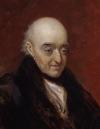Biography
an English poet, during his lifetime one of the most celebrated, although his fame has long since been eclipsed by his Romantic colleagues and friends Wordsworth, Coleridge and Byron. His recollections of these and other friends such as Charles James Fox are key sources for information about London artistic and literary life, with which he was intimate, and which he used his wealth to support. He made his money as a banker and was also a discriminating art collector.
His literary production remained slow. An Epistle to a Friend (the above-mentioned Conversation Sharp), published in 1798, describes Rogers's ideal of a happy life. This was followed by The Voyage of Columbus (1810), and by Jacqueline (1814), a narrative poem, written in the four-accent measure of the newer writers, and published in the same volume with Byron's Lara. His reflective poem on Human Life (1819), on which he had been engaged for twelve years, is written in his earlier manner.
In 1814 Rogers made a tour on the Continent with his sister Sarah. He travelled through Switzerland to Italy, keeping a full diary of events and impressions, and had made his way to Naples when the news of Napoleon's escape from Elba obliged him to hurry home. Seven years later he returned to Italy, paying a visit to Byron and Shelley at Pisa. Out of the earlier of these tours arose his last and longest work, Italy. The first part was published anonymously in 1822; the second, with his name attached, in 1828. It was at first a failure, but Rogers was determined to make it a success. He enlarged and revised the poem, and commissioned illustrations from J.M.W. Turner, Thomas Stothard and Samuel Prout. These were engraved on steel in the sumptuous edition of 1830. The book then proved a great success, and Rogers followed it up with an equally sumptuous edition of his Poems (1834). In 1850, on Wordsworth's death, Rogers was asked to succeed him as poet laureate, but declined the honour on account of his age. For the last five years of his life he was confined to his chair in consequence of a fall in the street. He died in London, and is buried in the family tomb in the churchyard of St Mary's Church, Hornsey High Street, Haringey . ..






